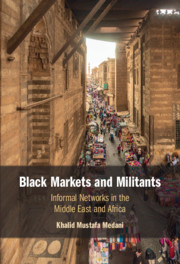Book contents
- Black Markets and Militants
- Black Markets and Militants
- Copyright page
- Dedication
- Contents
- Figures
- Tables
- Acknowledgments
- Preface
- I The Framework
- II The Institutional Context in an Era of Abundance
- III Globalization and Institutional Change in an Era of Scarcity
- 4 Economic Crisis, Informal Institutions, and the Transformation of Islamist Politics in Egypt
- 5 From Remittance Economy to Rentier State: The Rise and Fall of an Islamist Authoritarian Regime in Sudan
- 6 State Collapse, Informal Networks, and the Dilemma of State Building in Somalia
- 7 The Political Economy of Radicalization: Informal Networks and the Rise of an Urban Militant Islamism in Cairo
- Conclusion
- Book part
- Notes
- Bibliography
- Index
4 - Economic Crisis, Informal Institutions, and the Transformation of Islamist Politics in Egypt
from III - Globalization and Institutional Change in an Era of Scarcity
- Black Markets and Militants
- Black Markets and Militants
- Copyright page
- Dedication
- Contents
- Figures
- Tables
- Acknowledgments
- Preface
- I The Framework
- II The Institutional Context in an Era of Abundance
- III Globalization and Institutional Change in an Era of Scarcity
- 4 Economic Crisis, Informal Institutions, and the Transformation of Islamist Politics in Egypt
- 5 From Remittance Economy to Rentier State: The Rise and Fall of an Islamist Authoritarian Regime in Sudan
- 6 State Collapse, Informal Networks, and the Dilemma of State Building in Somalia
- 7 The Political Economy of Radicalization: Informal Networks and the Rise of an Urban Militant Islamism in Cairo
- Conclusion
- Book part
- Notes
- Bibliography
- Index
Summary
In Egypt, by the mid-1980s, as a result of a deep economic crisis, thousands of Islamic voluntary associations managed to develop a parallel economy and a parallel welfare system. In some instances, these modes of informal organizations translated into an Islamist-inspired challenge to the state. The rise in political influence of the Islamic Investment Houses dominated by the Muslim Brotherhood aided that organization in its recruitment programs that expanded its membership. Moreover, where radical Islamic groups were able to exploit informal financial networks and procure informal labor contracts for their supporters, particularly in the informal settlements around Cairo, they used these as bases of power and influence. Using private sources to establish social networks in defiance of state regulations, organizations such as the militant Islamic Group (al-jama’at al-Islamiyya) have sought to build, literally, a “state within a state.”
Keywords
- Type
- Chapter
- Information
- Black Markets and MilitantsInformal Networks in the Middle East and Africa, pp. 153 - 177Publisher: Cambridge University PressPrint publication year: 2021



